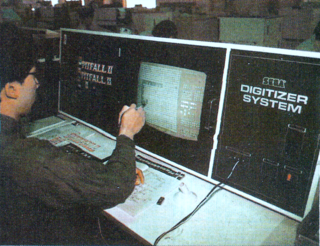Digitizer System
From Sega Retro
The Digitizer System is a piece of video game development hardware used by Sega during the 1980s and early 1990s. It was the primary means for Sega's artists to produce 2D images such as sprites and backgrounds, and is presumed to have been used for the vast majority of Sega games during this time period. It is assumed that three models exist, with the last being the Digitizer System III, however the existence of a "II" model has yet to be confirmed.
Much like a PC is a critical piece of equipment for today's artists, Digitizer Systems were the largest and most important thing on an artist's desk, comprising of two large screens and a number of inputs, such as floppy disk drives or ports for tablets. Original model Digitizer Systems came equipped with a light pen, however Mitablet-II KD4030[1] and KD4600[1] series digitizer tablets by Graphtec, using the computer-aided design (CAD) and drafting software application AutoCAD[2], were a standard with the Digitizer System III.
These types of tablets (Mitablet-II KD4030, KD4600) are essentialy low resolution digitizers, having a small work area that corresponds to the full CRT screen and are used for converting the physical locations into coordinate values for accurate data transfer. Very high resolutions in the order of 0.1mm or better can be achieved. Artists interact through a Puck, or pointer device, containing a coil which acts as a receiver or transmitter, and various functions can be assigned to its buttons, as needed.
Details of the systems' capabilites are not known, although it was possible to play back animations. It is said that they were linked up to NEC PC-9800 series desktops with hard disk drives in some way (permanent storage of programs and of data generated during various sessions of CAD requires a large amount of storage space).
Photo gallery
Digitizer System
Drawing the title screen of Pitfall II (System 1)
Digitizer System III
Graphics for Golden Axe II (Mega Drive)
References
- ↑ 1.0 1.1 http://www.graphteccorp.com/support/software/digitizers.htm (Wayback Machine: 2001-07-13 08:15)
- ↑ https://en.wikipedia.org/wiki/AutoCAD










